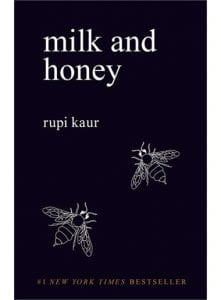Rupi Kaur: Milk and Honey
The New York Times bestseller, Milk and Honey is a collection of poetry and prose about survival. It is about the experience of violence, abuse, love, loss, and femininity. The book is divided into four chapters, “the hurting”, “the loving”, “the breaking”, “the healing” and each chapter serves a different purpose.
As Rupi Kaur’s book, Milk and Honey is split into four different chapters, personally, I feel that the most significant and most important chapters would be “the healing” and “the loving” mainly because they highlight self-love. The aim of the chapters is clearly to prove to her readers that self-love and self-appreciation/self-acceptance are what really matters the most in life – being comfortable in your own skin. I can relate to her poetry in these particular chapters as I myself have felt insecure and have felt that I am not good enough for our society which has high standards that constantly place me under pressure and self-doubt. I think that these chapters are indeed the best chapter in the book as they focus only on females which make it all the more intimate. Additionally, I feel as though it is important that poets and authors write books and stories about self-love because people in societies today tend to be segregated and labelled into specific groups which often causes anxiety and even depression. The groups could include gender, race, physical appearance or even the differently inclined in terms of sexual bias. All such groups are incessantly critiqued, sometimes positively and sometimes very harshly. Thus, writing books with such content could help raise people’s self-esteem.
However, in my opinion, I feel as though a majority of her poems in the chapters “the hurting” and “the breaking” are almost milked beyond limit or at least the idea of people in pain, physically and emotionally is reiterated so often that it almost seems as though the words are not genuine. Personally, I think that self-confidence should be prioritised more than hate and pain mainly due to the fact that people tend to retain negative impressions over positive ones (also known as the negativity bias) which if anything, could provoke a person’s depression or anxiety. Perhaps, an event which could be mentioned in the book could affect the readers in a negative way (for instance the mentions of rape and abuse), which is obviously not the aim of the poet. Furthermore, I feel that the poems are almost too simplistic throughout the book. It seems as though every single poem is too easy to understand and that there are no subterranean for me to think about. There seems to be no challenge in comprehending the poems.
Poems which are significant from the chapters “the loving” and “the healing”:
“I do not want to have you
to fill the empty parts of me I want to be full on my own
I want to be so complete
I could light a whole city,
and then
I want to have you
cause the two of us combined
could set it on fire”
Pg59 (the loving)
“I want to apologize to all the women
I have called pretty
before I’ve called them intelligent or brave
I am sorry I made it sound as though
something as simple as what you’re born with
is the most you have to be proud of when your
spirit has crushed mountains
from now on i will say things like
you are resilient
or
you are extraordinary
not because I don’t think you’re pretty
but because you are so much more than that”
Pg 179 (the healing)
“Loneliness is a sign you are in desperate need of yourself.”
Pg 153 (the healing)
“I didn’t leave because
I stopped loving you,
I left because the longer
I stayed the less I loved myself.”
Pg 95 (the breaking)
Perhaps, Rupi Kaur could have focused more on poems which are based on self-appreciation, particularly as the teenagers of today tend to easily slip into depression. Especially as they easily fall prey to the many triggers of the modern world, be it environmental problems like climate change and global warming or economic problems such as losing one’s job or simply fighting to find a foothold in a very competitive academic scene.

